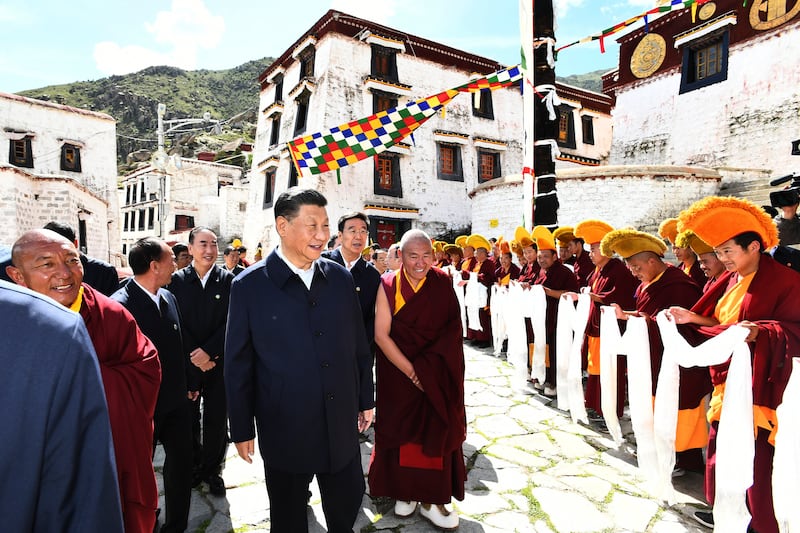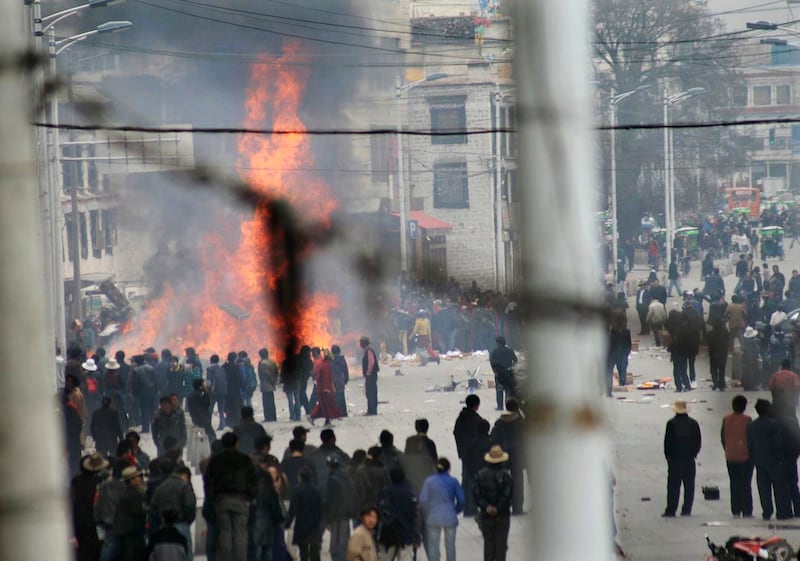Chinese leader Xi Jinping made a rare visit to Tibet on Wednesday to mark the 60th anniversary of the founding of the Tibet Autonomous Region — the consolidation of Beijing’s long-contested rule over the Himalayan territory.
Xi arrived by plane in Lhasa on his second visit to Tibet as president. Video broadcast by the Chinese government showed hundreds of people in traditional dress dancing with flowers and banging traditional drums as Xi walked the red carpet. Thousands more waved flags and white ceremonial Tibetan scarves along Xi’s motorcade route.
“One can read China’s leader Xi Jinping visiting Tibet twice in the last five years as a sign that everything is not rosy inside Tibet as Beijing portrays,” Namgyal Choedup, the representative of the Office of Tibet in Washington, told RFA.
“Despite more than six decades of the CCP’s rule, Tibet is essentially a police state and arguably the most surveilled region in the whole of PRC. Xi’s visit to Lhasa to mark the 60th anniversary of the founding of the Tibet Autonomous Region rings hollow because Beijing lacks both historical and popular legitimacy over its presence in Tibet.”

Xi was last in Tibet in 2021, where he urged people to “follow the party” in a visit largely seen by outside observers to signal the Communist Party’s confidence that order had finally been established in a region with a long history of protest against Chinese rule.
“To govern, stabilize and develop Tibet, the first thing is to maintain political stability, social stability, ethnic unity and religious harmony,” state media cited Xi as saying to senior Tibet officials on Wednesday.
Chinese government media also said Xi urged the building of a “modern socialist” Tibet “that is united, prosperous, civilized, harmonious, and beautiful.”
Communist forces occupied Tibet in 1951. Six years after the 14th Dalai Lama fled into exile in India following a failed uprising, Mao Zedong’s single-party dictatorship established the Tibet Autonomous Region in 1965. Decades of political repression followed, including the demolition of some Buddhist monasteries and the imprisonment of monks.
During a period following the 2008 Beijing Olympics, when China further opened its doors to the outside world, Tibet was rocked by protests by monks and a series of self-immolations.

Recent years have seen the virtual closure of Tibet to journalists and foreigners, the removal of Tibetan children from their families to boarding schools where they are taught in Mandarin, and the repression of all forms of political or cultural expression outside Communist Party control.
The Dalai Lama, who in July celebrated his 90th birthday at his home in exile in Dharamsala, India, stated that upon his death, he would be reincarnated as the next spiritual leader and that only the Gaden Phodrang Trust — his foundation — would be authorized to identify his successor.
Beijing maintains it has the right to approve the Dalai Lama’s successor.
With reporting from the Associated Press and Reuters.

